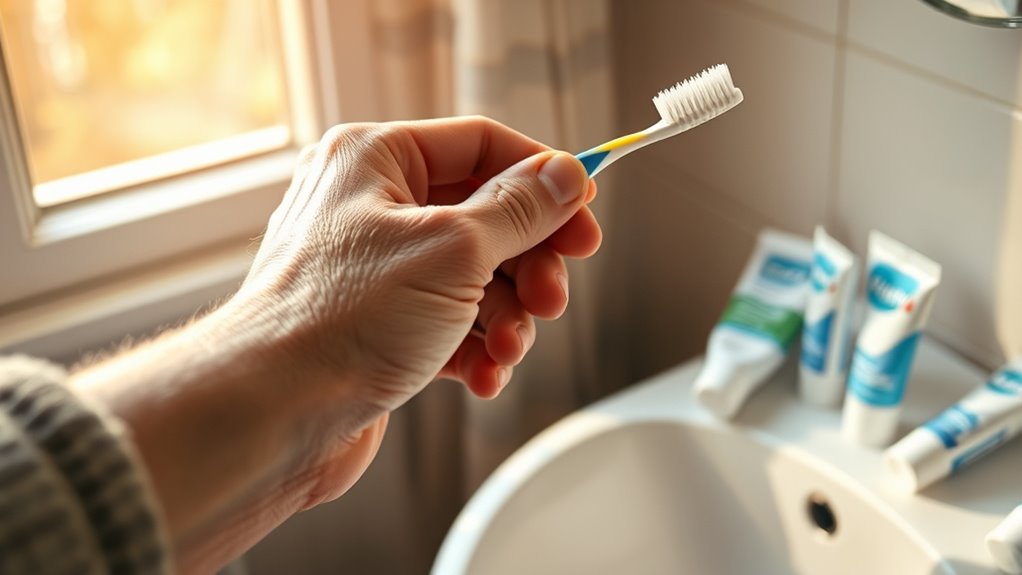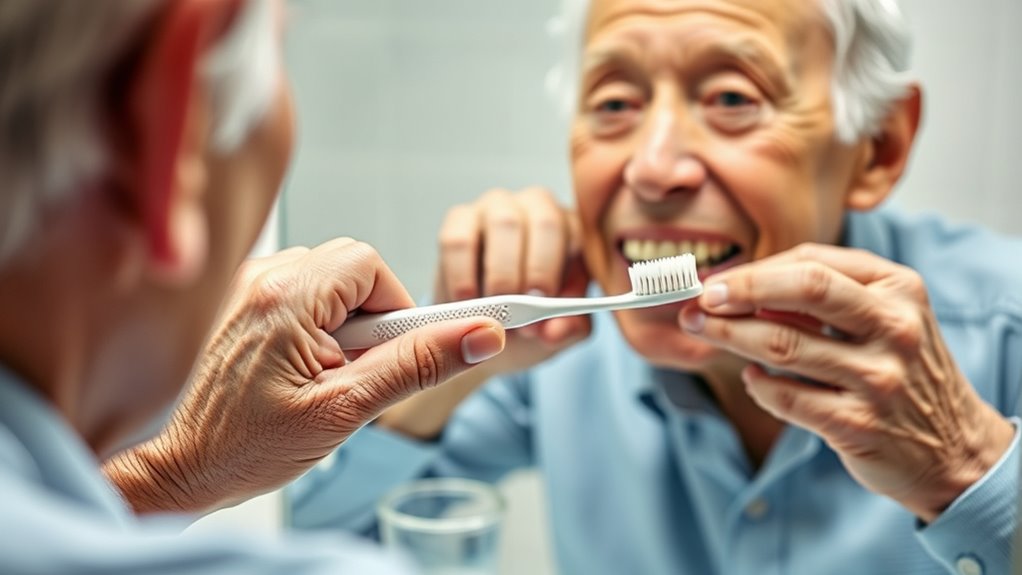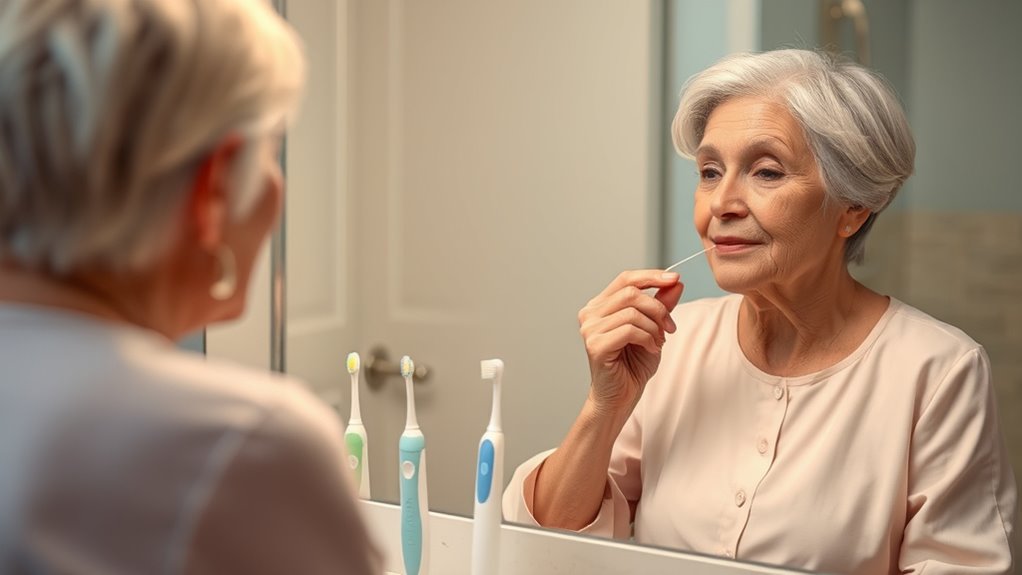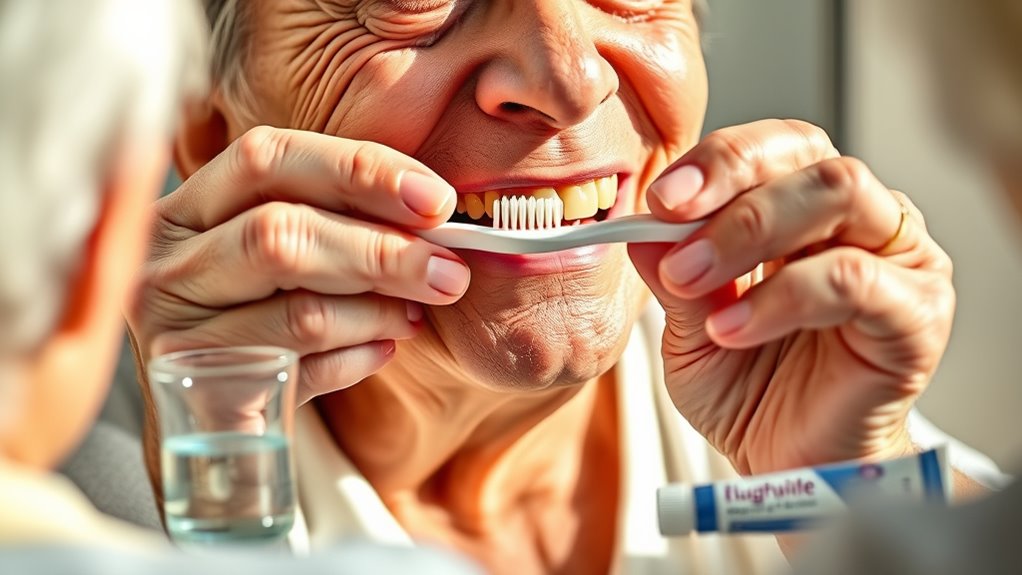To maintain good oral health, use a soft-bristled or electric toothbrush with fluoride toothpaste, replacing it every 3-4 months. Brush twice daily using gentle, circular motions for at least two minutes, and don’t forget to clean your tongue and gums. Floss daily or try alternatives like water flossers if needed. Incorporate mouth rinses for added protection, and visit your dentist regularly. Keep exploring for more tips to make your routine easier and more effective.
Key Takeaways
- Use a soft-bristled toothbrush and gentle circular motions to clean teeth and tongue daily.
- Floss daily with appropriate tools like floss picks or interdental brushes to remove plaque between teeth.
- Incorporate mouth rinses suitable for seniors to enhance cleanliness and freshen breath.
- Stay well-hydrated and use saliva substitutes or sugar-free gum to manage dry mouth.
- Maintain consistent routines with adaptive tools and proper positioning to ensure safe and effective oral care.
Choosing the Right Toothbrush and Toothpaste

Choosing the right toothbrush and toothpaste is essential for maintaining good oral health as you age. With toothbrush maintenance, you’ll want a brush with soft bristles to gently clean your teeth without damaging sensitive gums. An electric toothbrush can also improve plaque removal and reduce pressure on your teeth. When selecting toothpaste, pay attention to ingredients that support your needs, such as fluoride for cavity protection or desensitizing agents for sensitive teeth. Avoid toothpastes with harsh abrasives, which can wear down enamel over time. Proper toothbrush maintenance involves regularly replacing your brush every three to four months or sooner if bristles fray. Using the right oral care tools can also help prevent issues like dental erosion and promote overall oral health. By choosing appropriate tools and understanding toothpaste ingredients, you set a strong foundation for healthy teeth and gums as you age.
Proper Brushing Techniques for Seniors

Proper brushing techniques are essential for seniors to maintain healthy teeth and gums. Start by using a soft-bristled toothbrush and gentle circular motions to clean all surfaces of your teeth. Don’t forget to brush your tongue gently; this helps remove bacteria and freshen your breath. Incorporate a mouth massage by gently massaging your gums with your toothbrush or fingertip, stimulating blood flow and promoting gum health. Be sure to brush for at least two minutes, covering every area thoroughly. Avoid brushing too hard, which can damage your gums and enamel. Rinsing your mouth afterward helps wash away loosened debris. Consistently practicing these techniques ensures your oral health remains strong and comfortable, supporting your overall well-being. Maintaining digital literacy about oral health can further empower seniors to manage their dental care effectively.
The Importance of Daily Flossing and Alternative Options

After mastering effective brushing techniques, incorporating daily flossing into your routine plays a vital role in maintaining your oral health. Flossing removes plaque and food particles between teeth that brushing alone can’t reach, preventing cavities and gum disease. If traditional dental floss feels uncomfortable or difficult to use, consider dental floss alternatives like floss picks, interdental brushes, or water flossers. These tools can make daily oral hygiene easier and more effective, especially if you have limited dexterity or dental appliances. Additionally, optimal angles can enhance the effectiveness of your flossing technique, ensuring you reach all areas properly. Consistent flossing or using alternatives helps guarantee your mouth stays healthy, fresh, and free of decay. Prioritizing this step in your daily routine supports overall oral health and reduces the risk of more serious dental issues later on.
Managing Dry Mouth and Other Common Conditions

Dry mouth, also known as xerostomia, is a common condition among seniors that can lead to discomfort, bad breath, and an increased risk of tooth decay. To manage this, consider using salivary substitutes, which provide moisture and relief when your natural saliva is reduced. Staying well-hydrated is essential; drink water regularly throughout the day and avoid caffeine or alcohol, which can worsen dryness. Chewing sugar-free gum or sucking on lozenges can stimulate saliva production temporarily. Incorporate hydration strategies like sipping water frequently and moistening your mouth with a damp cloth if needed. These simple steps help keep your mouth comfortable, support oral health, and minimize complications associated with dry mouth. Regularly consult your dentist for personalized advice and treatment options. Using salivary flow enhancers may also help improve your natural saliva production and alleviate symptoms.
Incorporating Mouth Rinses and Additional Care Products

Have you considered using specialized mouth rinses and care products to enhance your oral health? Incorporating mouth rinses into your daily routine can help reduce plaque, fight bacteria, and freshen your breath. Look for rinses formulated for seniors or those with sensitivities, especially if you experience dry mouth or gum issues. In addition to rinses, consider other care products like fluoride gels or moisturizing sprays that provide extra protection and comfort. These products support your daily oral hygiene by targeting specific concerns, such as acidity or inflammation. Using mouth rinses and additional care products consistently can strengthen your oral health, reduce the risk of decay, and promote healthier gums. Regular use of products designed with quality assessment in mind can ensure you choose safe and effective options. Always choose products suited to your needs and consult your dentist for personalized recommendations.
Scheduling Regular Dental Check-Ups and Cleanings

Scheduling regular dental check-ups is vital for maintaining your oral health as you age. You should visit your dentist every six months, or more often if recommended, to catch issues early. Consistently sticking to your appointment schedule helps prevent problems and keeps your smile healthy.
Importance of Routine Visits
Regular dental check-ups and cleanings are essential for maintaining your oral health as you age. These routine visits help catch problems early, preventing more serious issues later. By scheduling regular appointments, you ensure your teeth and gums stay healthy, which supports overall well-being. Make sure your dental insurance covers these visits, so cost isn’t a barrier. During your appointments, your dentist provides valuable oral health education, teaching you proper brushing, flossing, and care techniques tailored for seniors. Consistent visits also allow your dentist to monitor for age-related changes and recommend treatments before problems worsen. Staying committed to these routine check-ups keeps your smile vibrant and reduces the risk of infections or decay. Prioritize your oral health through regular visits — your future self will thank you.
Timing and Frequency
Maintaining a consistent schedule for dental check-ups and cleanings helps guarantee your oral health stays on track as you age. Regular visits ensure issues are caught early, especially when adjusting for your meal timing and nighttime routines. To stay on top of your oral health, consider these tips:
- Schedule dental visits every six months, adjusting if your dentist recommends more frequent check-ups.
- Time your cleanings to align with your meal routine, avoiding sugary or acidic foods beforehand.
- Incorporate oral hygiene into your nighttime routine to prevent plaque buildup overnight.
- Plan check-ups around your existing health routines to ensure consistency and prevent neglect.
- Be aware of essential oils for toothache relief, which can be used when experiencing dental discomfort to support your oral health between visits.
Sticking to a schedule helps maintain oral health, supports overall well-being, and keeps your smile bright.
Tips for Overcoming Mobility Challenges During Oral Care

If mobility challenges make oral care difficult, using adaptive tools and devices can help you reach and clean your teeth more easily. Proper positioning and support strategies can reduce strain and improve comfort during routines. Simplifying your oral hygiene routine guarantees you can maintain good oral health without feeling overwhelmed. Incorporating ergonomic techniques can further enhance your comfort and effectiveness during daily oral care.
Adaptive Tools and Devices
Adaptive tools and devices can make oral care more manageable for seniors facing mobility challenges. These tools, such as ergonomic toothbrushes and specialized grips, help you maintain independence and improve effectiveness. Using adaptive devices reduces strain and makes brushing and flossing easier. Consider these options:
- Ergonomic toothbrushes with larger, non-slip handles for better grip
- Electric toothbrushes that require less manual effort
- Floss holders or picks to simplify flossing
- Tongue cleaners with ergonomic designs for easier use
Implementing appropriate tools can also help prevent injury and ensure thorough cleaning. Choosing the right adaptive devices ensures your daily routine remains comfortable and effective. These ergonomic tools are designed to accommodate limited mobility, helping you maintain good oral health with less frustration. Incorporating these devices into your routine can make a significant difference.
Positioning and Support Strategies
Using the right positioning and support strategies can considerably make oral care easier when mobility is limited. Start by ensuring the senior is comfortably seated or reclined in a stable position, which reduces strain and prevents falls. Use assistive devices like supportive cushions or adjustable chairs to improve stability. When necessary, caregiver assistance is essential; gently supporting the head and neck helps maintain proper posture and reduces discomfort. Always communicate clearly, explaining each step and checking for comfort. Adjust the environment to minimize obstacles and ensure easy access to oral hygiene tools. Proper positioning not only makes the process smoother but also helps prevent injuries, making daily oral care safer and less stressful for both you and the senior. Incorporating attention in the caregiving process can also enhance focus and reduce errors during oral care routines.
Simplified Oral Hygiene Routines
Mobility challenges can make daily oral hygiene routines more difficult, but simplifying these tasks can help guarantee consistent care. To overcome barriers, focus on easy, effective strategies.
- Use ergonomic toothbrushes with large handles for a better grip, reducing frustration.
- Break brushing into shorter sessions to avoid fatigue and maintain thorough cleaning.
- Incorporate mouth rinses to supplement brushing, especially if reaching is limited.
- Be aware of oral health myths—such as believing dietary influences alone cause problems—and focus on consistent cleaning to prevent issues. Simplifying routines helps dispel misconceptions and supports better oral health. Remember, maintaining routine care is essential, even if mobility is limited. These adjustments make oral hygiene manageable and help protect your smile. Additionally, selecting appropriate oral care products can further facilitate effective cleaning for seniors with mobility challenges.
Frequently Asked Questions
How Can Seniors Improve Their Oral Hygiene if They Have Cognitive Impairments?
To enhance your oral hygiene with cognitive impairments, focus on utilizing adaptive devices like electric toothbrushes or grips that make brushing easier. Incorporate memory support strategies, such as alarms or visual cues, to remind you to brush and floss regularly. Establish a consistent routine and work with caregivers to guarantee these steps are followed. These tools and supports help maintain your oral health despite cognitive challenges.
What Are the Best Methods for Encouraging Seniors to Maintain Daily Oral Care Routines?
You can encourage seniors to maintain daily oral care routines by using motivational strategies like positive reinforcement and setting routine reminders. Make brushing and flossing a part of their daily schedule, using visual cues or alarms. Offer gentle encouragement and praise their efforts, helping them feel accomplished. Consistent reminders and supportive words boost their confidence, making it easier for them to stick with healthy habits and prioritize their oral health.
Are There Specific Dietary Habits That Support Better Oral Health in Seniors?
You might think avoiding sugar is enough, but nutrient-rich foods and hydration habits play a vital role in oral health. Eating calcium, vitamin D, and antioxidants from fruits, vegetables, and dairy supports strong teeth and gums. Staying well-hydrated helps wash away food particles and bacteria, preventing decay. Incorporate these habits into your daily routine, and you’ll considerably boost your oral health, making dental issues less likely as you age.
How Can Caregivers Assist Seniors With Limited Dexterity in Oral Care?
You can help seniors with limited dexterity by using assistive devices like electric toothbrushes or adapted grips to make brushing easier. Encourage hand exercises to strengthen their grip and improve coordination. Offer gentle guidance and supervision, ensuring they’re comfortable and safe. Your support makes oral care less stressful, helping them maintain good oral hygiene and prevent dental issues. Always be patient and attentive to their needs during the process.
What Are Signs of Oral Health Issues Seniors Should Watch for Between Dental Visits?
Like a silent alarm, changes in your senior’s oral health signal underlying issues. Watch for gingival bleeding when brushing or flossing, as it’s often an early warning sign. Also, note tooth mobility or looseness, which indicates potential bone loss or gum disease. These signs shouldn’t be ignored, and prompt attention can prevent more serious problems. Regular check-ins help maintain their smile’s health and comfort.
Conclusion
Maintaining good oral health is vital for seniors, as it can considerably impact overall well-being. Did you know that nearly 25% of adults over 65 experience dry mouth, increasing the risk of cavities? By following daily routines like proper brushing, flossing, and regular dental visits, you can protect your smile and health. Stay consistent, adapt to your needs, and don’t hesitate to seek support—your mouth will thank you for it!









